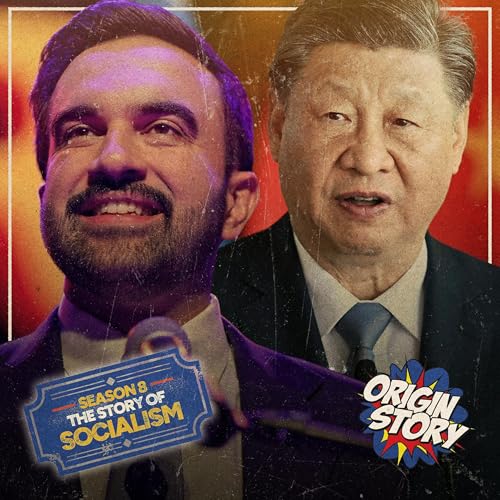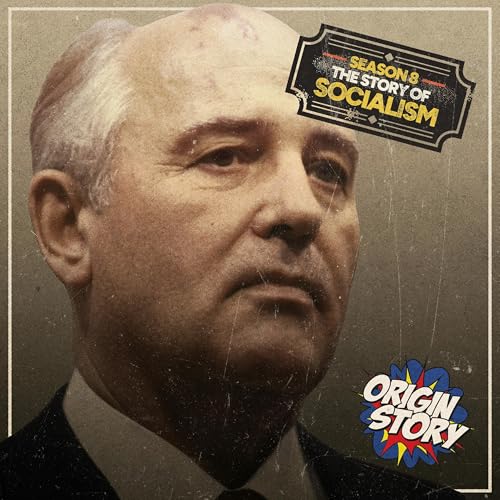This week’s episode is an edited version of Origin Story Live at the Tabernacle in London on Thursday 13 November. The theme is political insurgents: the politicians and thinkers who are reshaping politics in 2025. In part one we profile two of the most significant intellectuals on the radical right. The Cambridge academic James Orr is senior adviser to Reform UK, friend to JD Vance and networker extraordinaire. Curtis Yarvin is a far-right blogger whose extreme views on race, democracy and “techno-monarchy” are required reading in the Trump administration. Who are they? How did they become so influential? And — yikes! — what do they actually think? In part two we take a look at two young socialist politicians who have shaken up the left this year: the next mayor of New York City, Zohran Mamdani, and the new “eco-populist” leader of the UK Green Party, Zack Polanski. How have they risen so fast? What are they proposing? And could they be the future of socialism? We also take an axe to some of the buzzphrases that are making political discourse dumber, from “optics” to the “woke right”. And we answer some questions from the audience. If you missed the show and the livestream, or if you just want to relive the “magic”, dive in. • Use code ORIGINSTORY at the link below to get an exclusive 60% off an annual Incogni plan: https://incogni.com/originstory • Head to nakedwines.co.uk/origin to get a £30 voucher and 6 top-rated wines from our sponsor Naked Wines for £39.99, delivery included. • Get 25% off our highest tier annual Patreon subscription at https://www.patreon.com/originstorypod/membership • New Origin Story merch! https://podmarket.co.uk/collections/origin-story • Subscribe to Origin Story on YouTube • See Origin Story live at the Bloomsbury Theatre on 15th April 2026. Reading list James Orr • Nafeez Ahmed – ‘Cambridge Faculty of Divinity Ignores Demands for Inquiry Into Peter Thiel’s Far-Right Influence’, Byline Times (23 December 2021) • Robert Crampton – ‘James Orr: JD Vance is just a normal guy who likes his beers’, The Times (15 August 2025) • Zoltán Kottász – ‘“No civilisation has invited invaders in and put them up in four-star hotels”: James Orr’, European Conservative (13 August 2025) • Marie Le Conte – ‘James Orr: Reform’s polished extremist’, The New World (27 October 2025) • Charles Moore – ‘Perverted liberalism has left to neo-Marxism, perverted patriotism may yet lead to neo-fascism’, Daily Telegraph (15 August 2025) • James Orr – ‘Faith, Family, Flag, Freedom’ (2023) • Radical with Amol Rajan, Britain’s New Right: Could Reform Replace the Tories? (Dr James Orr), BBC (2 August 2025) • Noah Vickers – ‘James Orr: “This New Nation That’s Emerging Is Really No Nation At All’, The House (4 September 2025) Curtis Yarvin • Sam Adler-Bell – ‘The Radical Young Intellectuals Who Want to Take Over the American Right’, The New Republic (2 December 2021) • David Brooks – ‘The Terrifying Future of the American Right’, The Atlantic (18 November 2021) • Ava Kafman – ‘Curtis Yarvin’s Plot Against America’, The New Yorker (2 June 2025) • Jemima Kelly – ‘Sunday at the garden party for Curtis Yarvin and the new, new right’, Financial Times (8 August 2025) • Matt McManus – ‘Yarvin’s Case Against Democracy’, Commonweal (27 January 2023) • David Marchese – ‘The Interview: Curtis Yarvin Says Democracy Is Done. Powerful Conservatives Are Listening’, The New York Times (18 January 2025) • Corey Pein – ‘The Moldbug Variations’, The Baffler (9 October 2017) ... reading list continues on Patreon Written and presented by Ian Dunt and Dorian Lynskey. Producer: Simon Williams. Music by Jade Bailey. Art by Jim Parrett. Logo by Mischa Welsh. Group Editor: Andrew Harrison. Origin Story is a Podmasters production Learn more about your ad choices. Visit podcastchoices.com/adchoices
Mehr anzeigen
Weniger anzeigen
 Dec 20 20251 Std. und 40 Min.
Dec 20 20251 Std. und 40 Min. Dec 17 20251 Std. und 35 Min.
Dec 17 20251 Std. und 35 Min. Dec 10 20251 Std. und 32 Min.
Dec 10 20251 Std. und 32 Min. 1 Std. und 13 Min.
1 Std. und 13 Min. Dec 3 20251 Std. und 5 Min.
Dec 3 20251 Std. und 5 Min. 2 Std. und 3 Min.
2 Std. und 3 Min. 1 Std. und 34 Min.
1 Std. und 34 Min. Nov 12 20251 Std. und 36 Min.
Nov 12 20251 Std. und 36 Min.
